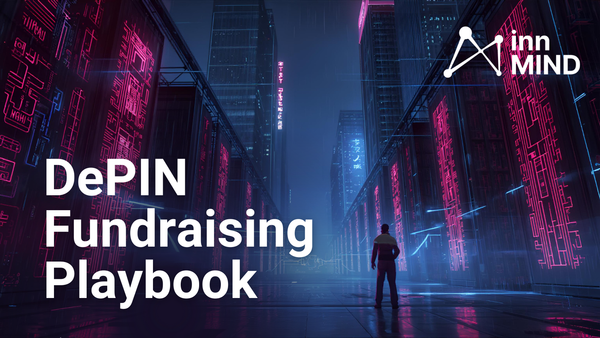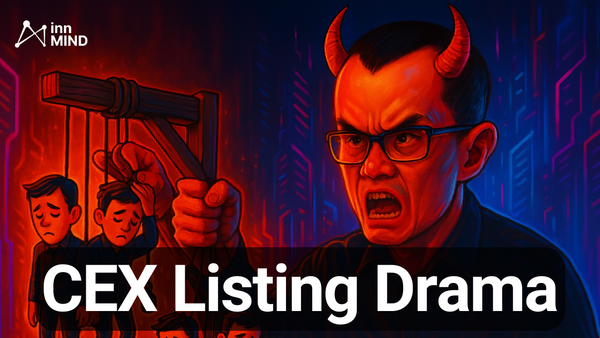Venture business and startups perspectives after the quarantine
Vitaly Golomb, managing partner at GS Capital, gives an interview about coronavirus pandemic, its effects on the venture market and fundraising opportunities for startups

We continue to learn investors' opinion in regard to the forecasts of economic development and its effects on the venture market and startups’ perspectives in 2020-2021.
You can read and watch our previous interviews with other investors on InnMind Youtube channel or in the blog.
This time we “pass a microphone” to Vitaly Golomb, managing partner at GS Capital.
Below you can read the interview with Vitaly Golomb:
– What do you think about the situation with the global stock markets crash? How long may it take to recover and how will it affect the business environment?
– We primarily deal with investment banking, with private companies in certain sectors, but we work with a lot of corporate investors and certainly, there is a big problem with liquidity. The first thing that gets cut out is anything that gets spent from the balance sheet because all the balance sheets are going to suffer.
Public companies that don’t have a strong balance sheet, don’t have enough cash to operate in this environment, are going to be under a tremendous amount of stress. Many of them will go bankrupt without any doubt.
Many companies have been spoiled over the last decade: being over leveraged, borrowing a lot of money due to the absence of cash flows and thinking that it’s always going to be there.
The stock market, of course, is a bit exacerbated, in part because we have algorithmic trading, so a lot of the triggers are getting ‘triggered’ with all these falling prices. So, the faster things fall, the more acceleration we see in that. At some point, we will hit the bottom and I think, we will start climbing back out but it’s going to be an uneven recovery, because some businesses are much more core and much more necessary than others. The travel industry, leisure hospitality are going to suffer greatly. A lot of countries that are depending on that primarily as their main industries are going to suffer greatly, so it’s going to be a very uneven recovery.
The interesting thing is to see China has already started coming back about 60 to 90 days depending on how you count this. They will recover well and all things are considered: factories coming back online and they will be in the first recession for a very long time, but other countries are gonna be in a much worse recession. The US has much more capacity to respond to a crisis like this. This is when the massive US military goes into effect. Just before we got online here to talk, there was an announcement that the Pentagon, the US military, is starting to activate its wartime medical facilities and capabilities to be able to supplement the healthcare industry that’s getting overwhelmed. So, the virus itself is a problem, especially for the high-risk people, but we’re talking about the main problem, it is overwhelming the capacity of the healthcare system. So, the US will be okay, the US will recover. But I’m really afraid that other countries will not have the capacity to do it. We have already seen what’s happening in Italy and that is a big lesson for everybody.
– Many global consultancy companies say that the major problem will be in the European Union, in Japan and a few other countries. What countries do you consider to suffer more from this?
– I think a lot of the global consulting companies are going to become experts in debt restructuring, just like they were in 2009-2010. I think that’s going to be heavily loaded. I mean Europe is where it helps to be a little bit conservative, so I think the big industries in Europe are not as over leveraged as some companies in the US. My favourite example is always Tesla. Now was the canary in the coal mine and smartly their CFO raised about a quarter worth of cash, about 2 or 3 billion dollars what they raised in the secondary offering. But other companies that are not over-leveraged have way too much debt. So any company that looks like that is going to beat up pretty badly even if it is in a great industry.
The good news is that when we come back from this shock, we’re going to see certain industries getting accelerated. So, the transition to electric vehicles, for example,we can fully expect to accelerate, because people are not just going to restart and do the same stupid things as before. They’re going to rethink certain things in a new way. I think a lot of people are going to get used to working from home and that’s going to become much more popular. So I think Silicon Valley will be just fine, because it’s mostly enterprise software and some consumer services. Obviously, things like Uber and Lyft are suffering right now because the demand is very low. But they really fall into that travel category and that’s temporary. Those things will happen.
And then one more thing - I saw memes circulating around saying that the climate change or climate crisis has to get coronavirus’s PR agent. So, hopefully when we come out of this, we’re looking at least into mid-June at this point for Europe and the US, people are going to be able to get a little bit soberer about what’s important. Hopefully, there will be the silver lightning on this whole thing.
–Yes, we have seen the CO2 emission in the countries which were mostly affected by a coronavirus, for now, it is really low. Good for all of us!
–Indeed!
–You have mentioned that we are not at the bottom yet in the stock markets, is it true? This is a question everyone is asking.
–I don’t have the answer. But I don’t think it’s a bottom, I think at some point, people are going to give up and just sell out of fear and panic. Maybe we’re approaching it, I don’t know.
We’ve lost what we went down from thirty thousand to under twenty thousand now. So we’ve erased the last four years of growth. I’m not sure if that’s enough. I mean, when we start coming back again it’s not going to be even. The big brands like Amazon will do fine, Apple will do fine, companies like that will do fine. Boeing is another company with a really bad balance sheet and compounding effects. So having a crisis with all the cancellations before...that might need to get bailed out or somebody’s going to come along, buy them and restructure the whole company. It’s going to be ugly. Does it have a loan or ways to go, who knows?
Maybe we’ll have a 50% fall, right now we have a little bit over 30% drop from the peak and that happened very fast, faster than ever. I’m thinking, can we get down to a 50% drop? Unlikely, but anything is possible at this point.
–How in your opinion will it affect the venture industry and the startups perspectives on fundraising?
–There are a few different ways to look at it.
First of all, over the last decades, a third or more of the capital in the venture industry has come from corporates, and about 80% of that is off balance sheets, 20% of that is dedicated to separated funds that are sitting in between vehicles. So 80% of the corporate venture will cease up, I think, quite heavily. It depends on how fast we get through this. But a lot of the companies that have invested this extra money they had on the balance sheet...all of a sudden that extra money is not available now. And they will need to do dire things, layoffs, etc. So that’s a problem.
Smaller investment funds that have committed capital, that think that they are doing great, are going to find out when they do capital calls that their LP, especially if they have family offices etc., are not going to deliver their capital, much like happened in 2001, much like happened in 2008-2009. Everybody is going to pause for about six months or maybe longer because it’s not just one event, we’re just at the beginning of it. That’s one factor.
And then for the larger venture funds, the issue is that they are going to do just fine. They’ve been complaining about valuations for a long time, they have a lot of capital and they know when to make investments. And in periods like this, the investments are done for the next generation in all of the great companies of this wave for the sharing economy like Uber, Lyft, Airbnb etc. (what happens with Airbnb is a separate story). All of those companies were born in 2009-2010 when everything was down, when valuations were down, where you can hire people, where people wanted to take a risk, especially consumer businesses, whereby consumers were willing to do something to save money and go for something new.
So, there are going to be some opportunities, there are going to be some great companies that are founded in the next 12 months, which are the next generation. And it’s probably going to be something around healthcare, population health, around automation, AI, transportation. We’ll see some great companies formed.
From perspective about entrepreneurs...I’ll give them the same advice I got when I was fundraising in 2008 with my startup, way back when I had the first meeting with Ben Smith. There were no venture funds back then and I wrote about him in my book. He said that nobody is interested in doing seed investments right now, they are all concerned about how not to lose their jets, their big VC’s, and he told me to come back in 6 months. So I would say: "be prepared for that". There are certain sectors and companies that are ongoing, that are not of a seed stage, that are far enough along, that need capital, expect at the very least valuations to come down. But if it’s a seed stage company, I think it’s going to be very difficult to raise any kind of capital in this environment in the foreseeable future.
–So, for seed companies, is it better to use the next six months period in order to redefine their business model and to get more prepared for fundraising when everyone will wake up?
–Yes, there are many companies that don’t have the luxury of being able to wait.. The founders are not sitting there on their personal wealth or if they were, it was invested in the stock market and they are going to feel a lot poor. So many of these companies will not make it through to the end. That’s just a fact.
The ones that will, are the ones that are making changes very quickly, cutting costs as fast as possible, cutting them to the bone, to where it hurts, to get into a cockroach mode, what I call it, then they will be able to survive. Because cockroaches can survive nuclear winter, startups need to get into a cockroach mode to get through this and be able to compete for capital on the other side.
The good news is that 20% of the companies that survive this period are going to have a lot less competition when they go out to the markets to risk capital. They can get smarter, people need to focus on bettering themselves, reading books, working on their business model and trying to position themselves for the new environment. Everything is going to be different when we come out of this, the world is going to change and they need to be ready for that.
– How do you think: is there a risk that a lot of investors which were considering risky startups , for example business angels, private ones etc. will right now switch to speculative investments in the stock markets? Because when it is down it is way more tempting to buy it out instead of investing in the startups.
– There are probably two classes of angel investors that are curious about tech investments and they make angel investments, and they don’t think about it, they don’t even really have a strategy, it's just emotional. Those people are going to be quite volatile right now, they might be afraid of the stock market, who knows.
And then, there are professional angel investors that are treating it as a fund, they have a strategy, they have a thesis for their investments. Those will be much more stable with that kind of a roadmap and maybe they adjust expectations, they adjust their check size, they try to spread it out a little bit more, they go a little bit slower because they can. And a lot of these things will change in the behaviour, but you can depend a little bit more on the professional angel investors. The hobbyist angel investors, I think, are going to go away.
We had a board meeting of the Ukrainian capital association on which I’ve been for almost 4 years this morning, and we discussed the need for investors to show support for the existing portfolio companies right now, to help them through this. And if they make commitments, they will follow through on those commitments. Of course, everybody is going to do what they decide is the right thing for their business.
–So with Ukrainian venture investment association everything is going well, they will not freeze or pause any activities, will they?
–Oh yeah, we have about 60 members from angel investors to big venture funds that are interested in supporting and investing in the Ukrainian startup ecosystem. So everybody makes decisions on their own.
We have major corporates that are part of this, we have individual angel investors that are active in Ukraine. The problem is that no matter how good they want to be about this and supportive, they have macro conditions that they can’t really control.
Ukraine was the best performing currency against a dollar last year in the world, and grew by 15% or more. Well, it’s falling just as fast. So the problem that you have with these developing economies, when it’s good - they grow fast, when it’s bad - that’s when this term risk that everybody’s been insulated against, that’s when the risky part becomes really negative. So, we will see what happens and how it goes in the next week or so, and that will be telling them what to expect.
At some point, people are going to get over the initial shock. I expect it is going to be in another week or two. And things will stabilize at whatever level we are at. I think it will be at least stable, we can maybe call the bottom at that point and then look for good news, and good news will hopefully give us a very accelerated V-shaped recovery depending on what that good news is.
And maybe vaccines that they started testing in Washington state yesterday, human trials, will prove to be effective, maybe it’s some other breakthroughs in healthcare that are showing better ways to fight this bug, to make it less lethal and less contagious. I’m keeping an eye on our two hour basis on this crisis to see what good news we could pull out of this. Hopefully, people will get over the shock, start working and be productive.
–Speaking about opportunities, what are the new opportunities that were hidden before and on which we are looking at right now? What opportunities can startups seize from a technological perspective?You already mentioned that it is a good time for smart mobilities, if I understood correctly, which will grow up after the crisis. But what are the sectors that can benefit from it?
– Honestly, I think if your only tool is a hammer everything looks like a nail. So, certainly it’s a little bit self-serving, I work heavily in mobility. We see that there is a lot of positivity, because we are talking about the transition to electric vehicles and autonomous vehicles, and we think that things like that, which already made sense, are going to accelerate as people come back.
It doesn’t make sense for factories to come back online and for somebody to talk about doing internal combustion engines, it just doesn’t make much sense anymore. And I think people are getting shocked into that, and ,I think, also the good news is that people are starting to understand what a crisis is and start to feel it.
When somebody says ‘climate crisis’, which is going to be far worse than this, they understand what that means, and all of a sudden billions of dollars in shifted business, because you can’t pollute the air anymore, doesn’t seem like a big deal. So you’re going to see that positive movement.
For startups, you need to be honest with yourself, look in the mirror and think about what you are working on. Is it a nice to have or is it necessary,important and makes a big difference? And focus your efforts in those directions because those are the only things that will get funded in the short term, and if you’re going to spend your nonrefundable lifetime on something, it might be something that makes a positive impact.
So that’s just my philosophy, everybody is going to work on their things, on digital tattoos and e-cigarettes or whatever they want. But I tend to focus on things that are kind of positive and make an impact as well as good investments.
– As an investor yourself, are you going to switch your investment focus to anything new due to this situation?
– I did some personal investments but GE Capital is an investment bank so our job is to help companies raise money, our job is to help sell companies or sometimes represent large companies on the buy side to help them find companies to acquire. That’s primarily what we do.
We are focused on helping our clients right now to get through a lot of the transactions that we’re in the middle of and supporting companies that need our help in figuring out where to go. We’re their financial professionals, we can come in and objectively look at companies’ balance sheets, help them restructure the business so they don’t go out of business, or better they may take advantage of this. And one of the strong ones survive and thrive when the economy recovers. So that’s our approach, that’s how we look at it.
From my personal investments, I fall into the hobbyist category so I’m definitely on pause and just focused on the primary business. My wife is a corporate attorney and she’s also in a firefighting mode to help her clients figure out how to stay in business and not get sued too badly down the road with labour laws and everything else that’s coming together.
– Vitaly, the last question is what will you recommend or advice to startup entrepreneurs to secure and maintain their business during this turbulent time?
– Cut all expenses as much as possible, save money, cash is king. You need to be able to survive this, you need cash anytime. Time is money. And reduce your burn rate as much as possible.
If you have customers, if you are at that stage and you have customers that owe you money, try to be aggressive collecting money because some of your customers are not going to make it and those accounts receivable are going to evaporate. Don’t depend on that.
If somebody is offering you an investment and it’s not the best terms or something that you thought would be reasonable last week, change your mind. And cash is king again.
Do whatever it takes to build up your war chess right now because we are in a war. And the only way you’re going to get through this as a business is to have money in the bank to be able to keep operating.
– Thank you, Vitaly, so much for your interview and your advice! Stay safe!
– You too.
–Thank you!
New digital opportunities to boost your business:
▶ Agriculture Innovation Challenges to realise your innovative ideas in the field of data collection & agriculture





